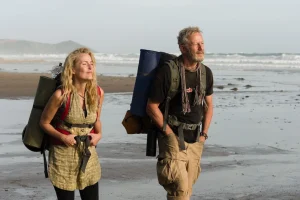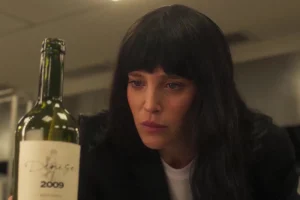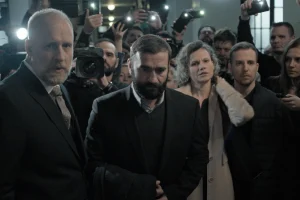A trio of pro-Russian apologists travel from Prague to Kharkiv to get a first-hand view of Putin’s war in Ukraine in Change My Mind (Velký vlastenecký výlet), an existentially draining new documentary now playing in Prague cinemas (and with English subtitles at Kino Atlas, Kino Světozor, Kino Aero, and elsewhere). The merits of this film as a documentary can be debated, but its value as a contemporary record cannot: Change My Mind is a devastating snapshot of the times we are living in, and should be seen by anyone who can stomach it.
Spoiler alert: no minds were changed in the making of this film, except perhaps of the filmmakers, who are given a vomit-inducing first-hand window into vile hatred and spectacular bad takes. The protagonists of Change My Mind are unfazed by the horrors they witness, but by capturing their reaction, the filmmakers come out of the movie drained of hope for humanity. So does the audience.
It seemed like such a nice idea at the time. Curious about the pro-Russian sentiment in the Czech Republic amidst the war in Ukraine—especially odd given the parallel to the 1968 Soviet invasion of Czechoslovakia, which Change My Mind opens with—writer-director Robin Kvapil put out a casting call for Putin apologists willing to confront the war. Literally. His crew would take them to the front lines near Kharkiv, and see if the first-hand experience altered their perspective.
After receiving about 60 applications, Kvapil settles on three: pig farmer Nikola, who sees Putin as the last bastion of hope in combating intrusive Western ideology (he invokes the Green Deal more than anything to do with Ukraine); family-less man Ivo, who spouts the usual Kremlin propaganda about de-Nazifying Ukraine; and Petra, daughter of communists, who blindly supports Russia for reasons that we suspect she herself does not fully comprehend.
The unwitting protagonists of Change My Mind—unlike the neo-Nazi in Vít Klusák’s similarly-themed The White World According to Daliborek—are just simple common clay types. They could be your neighbor, your uncle, your kids’ schoolteacher. We never really get a sense of why they believe what they believe (or even the full extent of their beliefs; Ivo refers to himself as a ‘conspiracy nut’), and it’s clear that the filmmakers are not so interested in exploring them as people, but as test subjects in an ill-fated experiment.
It’s clear where this film is headed as soon as the trio head out from Prague to Ukraine, and Petra bursts into an unprovoked rendition of the Soviet national anthem. Ivo blindly joins her for a verse before thinking better of it, while Nikola shares an awkward glance at the camera. Despite the shared support of Russia, they have little love for each other, a fleeting insight that will largely go unexplored.
The trio meet with security experts who explain what to do in an emergency, schoolchildren who are taught in an underground bunker throughout the day, a charity worker who aids children that have been raped by Russian soldiers, and survivors who tell them stories of the carnage that lies around Kharkiv. In front of these others, they behave themselves with decency, careful never to betray what they really think.
Alone with the filmmakers, it’s a different story. When asked what he thinks of the Russian soldiers raping young children, Ivo attempts any means of sickening justification, rationalizing that he can understand if a soldier thinks he has a short time to live, and happens to see a pretty girl. One crew member stands and exits the movie. We might consider doing the same.
In one of Change My Mind‘s most surreal moments, Petra hugs a man in tears after he tells them the story of how he lost three young grandchildren in a Russian airstrike. He thanks her for the support the Czech people have provided, unaware of the nature of her personal support. Inexplicably, she has salvaged a “souvenir”—a small toy—from the rubble where the man’s grandchildren were killed, and asks him if she can keep it. To this, he does not know how to respond.
In The White World According to Daliborek, Klusák took his protagonist to the gates of Auschwitz, where he spouted ill-informed conspiracy theories and was publicly shamed by a survivor. Dalibor was a caricature, confronting a history he was ill-equipped to understand, and we could take satisfaction in his public embarrassment.
The protagonists of Change My Mind, meanwhile, are far more insidious. While visiting a mass grave where the remains of 400 civilians were recovered after Russian troops were driven out, Petra remarks on the pleasant smell of the pine trees, and how the whole thing feels “fake” (because of the riddles she speaks in, it’s not quite the gotcha moment the filmmakers might be hoping for). Nikola tells her to keep quiet, in what feels not like a suggestion of decency, but rather an effort to obscure their true beliefs.
These people are not confronting history but rather the present, through their own eyes and testimony from witnesses. And yet they are still unable to bear witness to the reality that surrounds them, but instead remain transfixed in a hyperreality dictated by the propaganda they consume.
We should all be able to agree that innocent civilians should not be tortured and killed and dumped in the woods, that children should not be raped. But because the Green Deal is throttling emissions on 1980s automobiles across Europe, something something, these actions are somehow justified in these warped minds. It is unfathomable.
Change My Mind tells us nothing new, through a narrative that is rarely engaging and consistently frustrating. Spend a couple hours on Facebook or X scrolling through comments and you’ll get the same experience as watching this movie. There’s no reaching these people, and you already knew that. But you might need to see this film anyway, if only to bear witness to the world we live in, and mourn what remains of our humanity.














